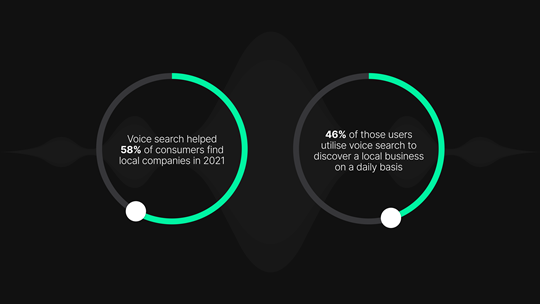How do I optimise my site for voice search?
Significant technological breakthroughs appear to be modifying how we all use the internet. As voice search technology has progressed in recent years, the way many of us search online has altered. To capitalise on voice search analytics' rapid rise in popularity, SEO strategists must now recognise emerging tendencies.
What is voice search?
When Google first introduced voice search queries in 2011, it was more of a novelty than a function that people depended on. Since then, voice search has risen to the forefront of search marketing thanks to advancements in speech recognition technology. As voice activated technology improves and connected devices add and enhance speech-enabled functionalities, digital marketers are now utilising the most recent voice search statistics to spot new trends that suggest how their consumers' search habits are likely to change in the future.
Improvement in AI
Artificial Intelligence (AI) and Machine Learning advancements have had a significant impact on how we interact with our smart devices and conduct internet searches. Google RankBrain is a good example, as it's designed to detect words and phrases so that it can learn and anticipate outcomes better. When RankBrain sees a phrase it hasn't heard before, it makes the best 'guess' it can about the meaning and intent of the searcher, then provides appropriate matching replies. This capacity to 'think' allows AI like RankBrain to handle unexpected search requests more effectively.
Because AI-powered devices are becoming more common, search algorithms must adapt to accommodate not only machine learning, but also the unique use cases that arise from how we utilise these devices in our daily lives.
The rise of smart speakers
Smart speakers are getting more popular in homes all over the world. Early Amazon Alexa, Google Assistant and Siri products were merely unique and interesting; it was amusing to ask Alexa ridiculous questions just to see how 'she' would react. Since then, voice technology has vastly improved, as has new hardware like Google Home and the Apple HomePod, with other digital behemoths hurrying to deliver their own smart speaker technology and integrations in order to keep up with consumer demand.

Global Mobility
Not just smart speakers, but a wide range of technologies are driving voice search. Anyone with a smartphone understands that voice search is more mobile than ever before. Google Voice Search, for example, is now available in over 100 languages on mobile devices. Google has previously reported that voice search accounts for 20% of searches on the company's apps and Android smartphones, with that figure expected to increase in coming years.
Local & Hyperlocal Search
According to recent trends, voice search users are increasingly looking for local results. Voice search has helped 58% of consumers find local companies in the last year. Not only is the number of voice search users increasing, but the volume of voice searches is also increasing, with 46% of those users using voice search to discover a local business on a daily basis.
Google reports that searches for 'near me' businesses have risen considerably in recent years. Local businesses will therefore continue to benefit greatly from the surge in local voice search. One of the main forces behind the growth of local search is the fact that smartphone searches have outpaced desktop searches since 2015. As a result, retailers and marketers have had to fine-tune their efforts in order to take advantage of the development of hyperlocal searches. Ads can now be targeted at local search users, even if they are only within a small radius.
How is voice search changing SEO?
Because of the global push to perfect speech technology, marketers will need to fine-tune their digital strategy on a regular basis to ensure that it is optimised for voice search SEO. Google's speech recognition is already 95% accurate, and Google isn't the only tech business attempting to improve voice recognition in order to capitalise on voice search.
iFlytek, a Chinese company, has developed a speech recognition technology with a 98% accuracy rate. Its technology will not only accurately translate English to Mandarin, but also Mandarin to English, Korean, Japanese, and 22 different Chinese dialects. Within three years, its team expects to achieve 99% accuracy.

Long term voice search strategies
With voice search likely to increase in usage in our daily lives - how can you ensure long-term success for your business?
Understand your customer
Marketers must delve deeper into knowing the consumer and their behaviour, just as voice search algorithms employ data, location, and other data points to comprehend search context.
Consumer insights and real-time data can be used to figure out how different people use voice search and what type of speech-enabled gadget they use.
Conversational keywords
Whilst short tail keywords will never go away, they do become much less useful when we consider the natural phrases used in voice searches. Conversational long-tail keywords are more important than ever for marketers.
Creating personas
When it comes to optimising for voice search, brevity, context, and relevancy are crucial. What distinguishes this SEO strategy from others is the fact that marketers must now pay special attention to:
- Developing detailed responses to frequently asked questions.
- Provide succinct answers to queries.
Create content that addresses your readers' most pressing concerns and alleviates their problems.
Many websites have successfully adopted the following strategies:
- Make a title for your article or webpage that asks a common question.
- Provide a concise answer or definition to the query immediately below the headline.
- Use the remainder of the page to provide additional information about the topic.
The key component of this strategy is that the SEO-rich web page ultimately appeals to Google's ranking algorithm. Simultaneously, the short-and-sweet content at the top of the page is optimised for voice search and could become a highlighted snippet.
Schema mark-up
Crucial to the long-term success of any web page is schema markup. Schema is used to mark up your content to tell search engines what your site is about. This HTML add-on aids search engines in comprehending the context of your material, helping you to rank higher in general searches and be more relevant when answering voice search questions. Thanks to schema, Google can analyse language, making it a fantastic method to add more information to your website, so you can answer enquiries.
Based on 9,400 schema implementations, Milestone Marketing observed significant improvements of +20-30% – with an average of:
- 40 different schema types.
- 130 traits and properties in total.
This is the type of data that mobile users and voice searchers will be looking for the most.

Answer FAQs
When asking a question, voice searchers usually start with a traditional 'who', 'what' 'where', 'when' and 'how'. They're searching for solutions to a pressing problem. To answer these questions, create a FAQ page and begin each question with these adverbs. Then, in order to appeal to voice search, react in a conversational fashion. From a performance aspect, make sure your website is technically sound and includes schemas. Make sure the navigation and informational structure are easy to find and that the page loads quickly.
Think local & mobile
We're heading toward a mobile-first future in which both devices and people are constantly on the move. As a result, it's vital to keep in mind that mobile and local are inextricably linked, especially when it comes to voice search. Searching whilst on the move is becoming increasingly frequent, with many users conducting local searches while on the go. Users can then use voice search to ask hyper-local questions.
Make sure that both users and search engines can access your website's directions to physical locations and XML sitemaps. Create different experiences for desktop and mobile users, such as optimising for 'near me' type queries on mobile.
Finally, make sure your mobile strategy is comprehensive and that you're focusing on improving website performance and loading times.
What does the future hold for voice search?
Many people who grew up when technology couldn't respond have a poor perception of chatting to our phones when there's no one else on the other end. Younger generations are less apprehensive, and the majority regard voice search as 'tech-savvy'. The rise of voice search is undeniable, and we'd be remiss in the SEO industry if we disregarded it.
Because voice is a winner-take-all search result, it's time to stop thinking about it and start optimising for it. Find out how we can help you with your SEO.
